


Imagine a medical practice where patient information is instantly accessible, no-shows are rare, and staff focuses on care instead of paperwork. This is what healthcare CRMs deliver. These systems work behind the scenes organizing patient data, automating routine tasks, and improving how you connect with patients.
This guide explains what these systems do, what features to look for, and how to choose the right one for your practice’s needs.

A healthcare Customer Relationship Management system is software that bridges the gap between patient care and practice management. Unlike business CRMs, these systems are built specifically for medical environments where relationships aren’t just about sales but about health outcomes.
Healthcare CRMs centralize patient information and create a comprehensive view that helps deliver more personalized care. They transform scattered data into actionable insights while automating routine tasks like appointment reminders.
What sets healthcare CRMs apart is their focus on privacy and compliance with medical regulations like HIPAA. They’re designed to handle sensitive information securely while still making it accessible to authorized staff when needed. This balance of security and accessibility forms the foundation of a system that improves patient satisfaction and practice efficiency.
When choosing a healthcare CRM, certain things are essential for maximizing patient care and operational efficiency. Let’s explore the features that any effective healthcare solution should include.
The foundation of any healthcare CRM is its ability to store and organize patient data efficiently. A good system creates comprehensive patient profiles that include contact information, demographic details, insurance data, and interaction history.
This approach eliminates the need to search through multiple databases, giving staff instant access to important information. These systems also allow for customizable fields to accommodate specialty-specific data points.
Healthcare data requires exceptional protection. Effective CRMs incorporate multiple security layers, including encryption, access controls, and audit trails.
These systems should automatically log who accessed what information and when, creating accountability throughout your organization. Patient trust depends on your ability to keep their sensitive information safe, making this feature non-negotiable.
Healthcare CRMs streamline scheduling by showing available time slots across providers and locations. They automatically send reminders via text or email, significantly reducing no-shows.
Some systems even allow patients to book their own appointments online, filling schedule gaps without staff intervention. Smart scheduling features can also match appointment types with the appropriate time slots, preventing scheduling errors that waste time.
Effective communication builds trust between patients and providers. CRM communication tools include secure messaging, automated follow-ups, and targeted outreach capabilities.
These features help maintain contact between visits, improving care continuity. Some CRMs can personalize communications based on patient history, sending relevant health information or preventive care reminders.
Integration with electronic health records (EHR) systems eliminates redundant data entry and ensures information consistency. When clinical and administrative systems work together, staff spend less time on paperwork and more time with patients.
This integration creates a complete picture of each patient’s journey, improving care coordination and reducing the risk of medical errors that can occur when information is fragmented across systems.
Monitoring patient treatment plans helps ensure nothing falls through the cracks. CRMs can track prescribed medications, therapy schedules, and follow-up appointments.
Automated alerts notify providers when patients miss important care milestones. This oversight is particularly valuable for managing chronic conditions or complex treatment regimens where consistent care delivery directly impacts patient outcomes.
<div class="post_divider"></div>
⭐ Our experience
Biogeek is a platform where people choose their tests, visit a lab once, and receive clearly explained results on their phones or computers. No more deciphering medical jargon or scheduling follow-ups just to understand basic numbers.
Balancing simplicity with medical accuracy was our main focus. We used color-coded indicators and plain language explanations, while ensuring doctors could still access the detailed technical data they need.
From concept to launch took just under 5 months, and the response has been remarkable – users especially appreciate how the platform helps them track health markers over time.
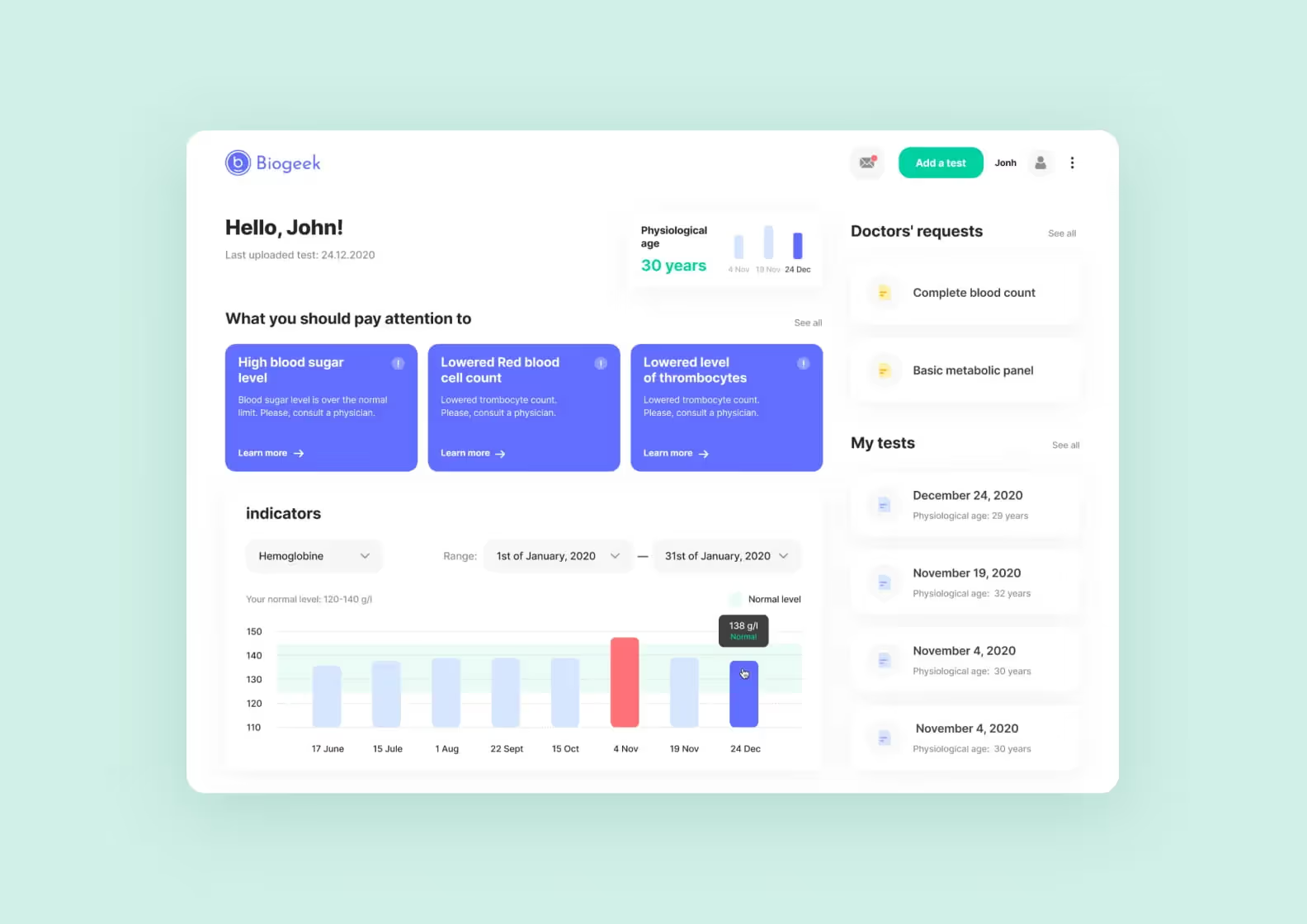
<div class="post_divider"></div>
Financial health is crucial for practice sustainability. CRM billing features help track insurance claims, patient payments, and outstanding balances.
By integrating clinical documentation with billing processes, these systems help ensure complete and accurate claims submission, reducing denials and accelerating payment cycles.
Data-driven decision-making improves clinical outcomes and business performance. Healthcare CRMs generate insights on patient demographics, appointment trends, and staff productivity.
Custom reports help identify care gaps, while dashboards provide at-a-glance performance metrics. This analytical capability transforms raw data into actionable intelligence that guides strategic planning.
Healthcare happens beyond office walls. Mobile-friendly CRMs allow providers to access patient information from anywhere, making home visits and remote consultations more effective.
Integrated telehealth features enable virtual appointments without switching platforms. This flexibility supports modern care delivery while improving provider work-life balance through more flexible scheduling options.
When properly deployed, CRMs deliver tangible improvements across multiple areas of a healthcare organization. Here’s how a well-chosen CRM can benefit your practice.
Healthcare CRMs create smoother patient journeys from first contact to ongoing care. With all information centralized, patients avoid repeating their stories multiple times.
Appointment reminders arrive when needed, waiting times decrease, and communication becomes more personal. This attention to detail makes patients feel valued and understood, rather than processed through an impersonal system.
<div class="post_divider"></div>
⭐ Our experience
Our client had a vision: create an online therapy platform that would actually feel welcoming and human. Unlike other mental health apps that feel clinical and cold, they wanted something that reflected the warmth of in-person therapy.
But how do you build trust through a screen? Our solution focused on creating comfortable “digital rooms” where therapists and patients could connect. We ditched the usual complicated menus and instead designed conversation flows that felt natural, almost like texting a friend.
Security was non-negotiable, given the sensitive conversations happening on the platform. We built multiple privacy layers while keeping the experience simple for users. The scheduling system we created avoided the typical calendar headaches by suggesting times based on both therapist and patient preferences.
The platform now connects hundreds of therapists with patients who might never have sought help if they needed to visit an office in person.
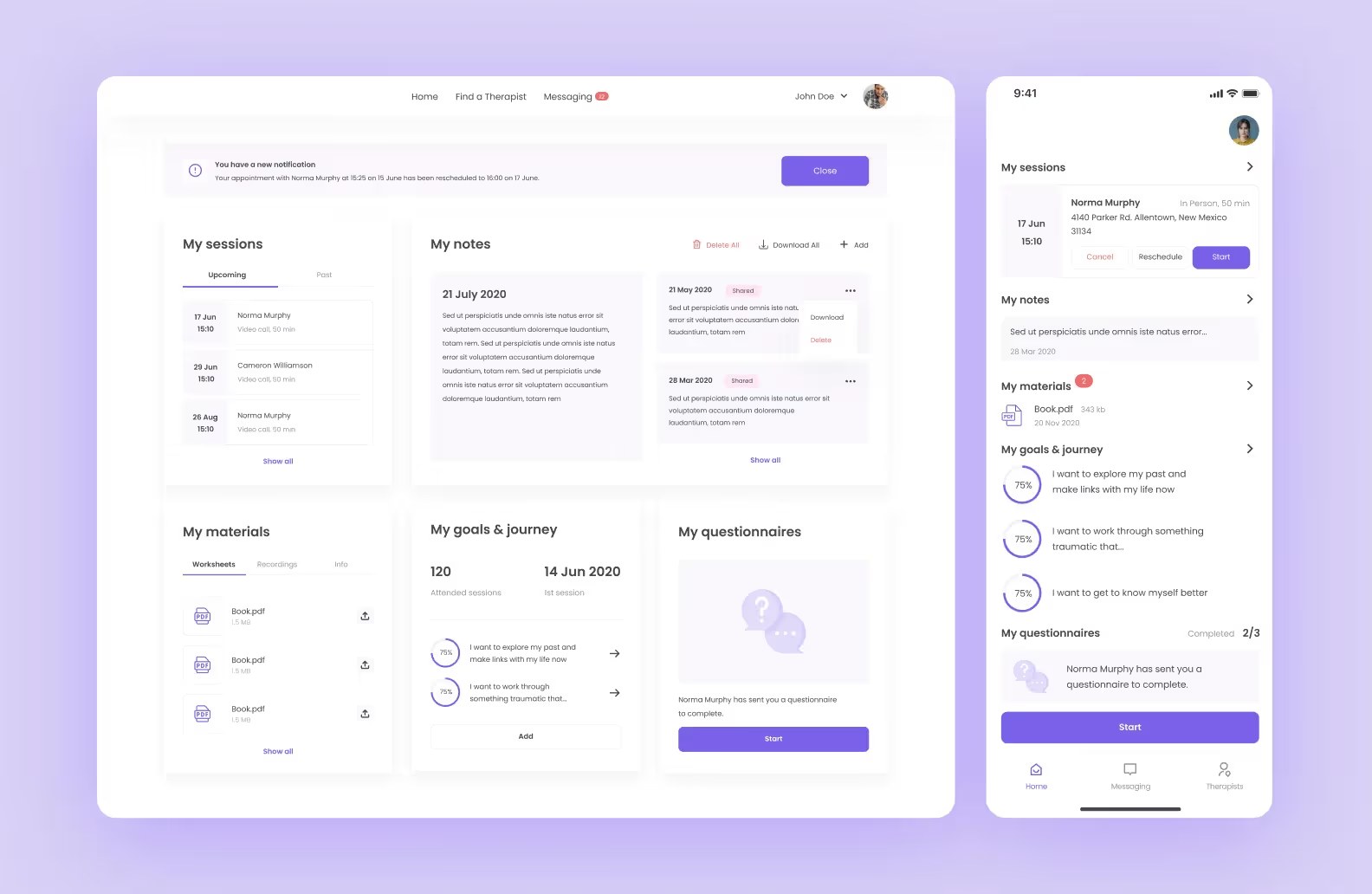
<div class="post_divider"></div>
Staff spend less time on paperwork and more time on patient care when routine tasks become automated. Scheduling becomes more intelligent, reducing gaps and overbooking.
Document management improves with centralized storage and retrieval. These efficiency gains allow your team to handle higher patient volumes without feeling overwhelmed. The workday becomes more predictable, reducing staff burnout and improving job satisfaction.
Healthcare CRMs turn scattered information into meaningful insights. You’ll spot trends like busy periods, popular services, or underperforming areas.
These patterns help you make smarter choices about staffing, resource allocation, and service offerings. Rather than relying on hunches, you’ll have solid evidence to guide practice growth and improvement, leading to better strategic decisions.
Though implementing a CRM requires initial investment, it pays for itself through operational savings. Fewer missed appointments mean better resource utilization.
Automated billing reduces payment delays and improves cash flow. Plus, staff productivity increases as manual tasks decrease.
Building lasting patient relationships becomes easier with CRM tools that track preferences, history, and needs. Personalized service and timely follow-ups show patients you remember and value them.
Proactive outreach for preventive care demonstrates your commitment to their health beyond immediate concerns. These connections foster loyalty in an increasingly competitive healthcare landscape.
Meeting complex regulatory requirements becomes more manageable with CRMs designed specifically for healthcare. Built-in compliance features protect patient information and maintain proper documentation.
Audit trails track all system activities, simplifying regulatory reporting. This protection reduces legal risks while building patient trust in your practice’s professionalism and reliability.
North American companies make up over 51% of all healthcare CRM systems sold worldwide. Many of these systems now work with smartwatches and fitness trackers and use smart technology to make predictions about patient needs.
Here’s an overview of the top solutions.
Epic Systems has expanded its offerings with Cheers, a dedicated healthcare CRM built to work with their existing clinical systems. This integration creates a unified patient record that bridges clinical and relationship data.
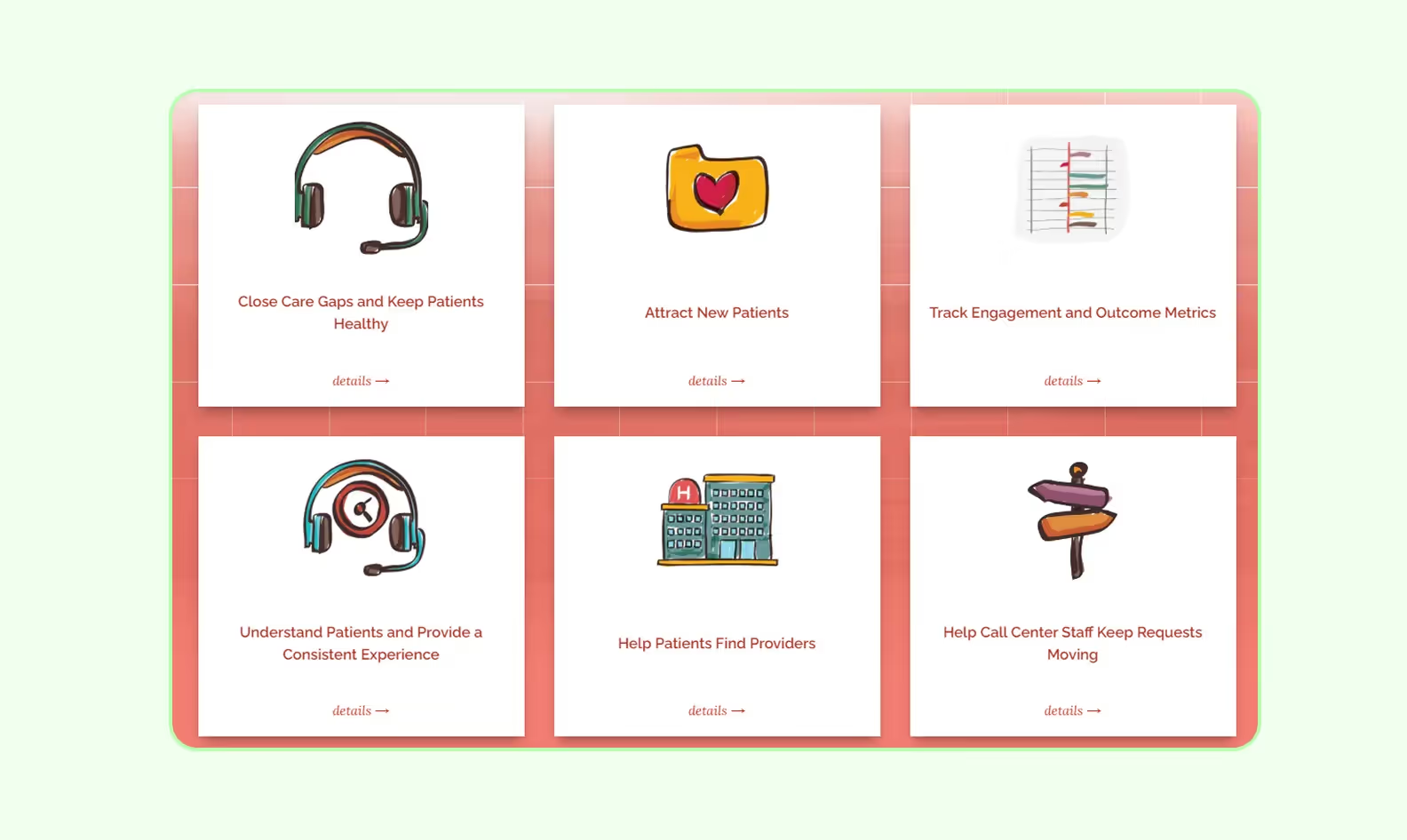
Features:
Salesforce Health Cloud uses the company’s CRM expertise while addressing healthcare-specific requirements. Its platform approach allows for extensive customization while maintaining regulatory compliance.
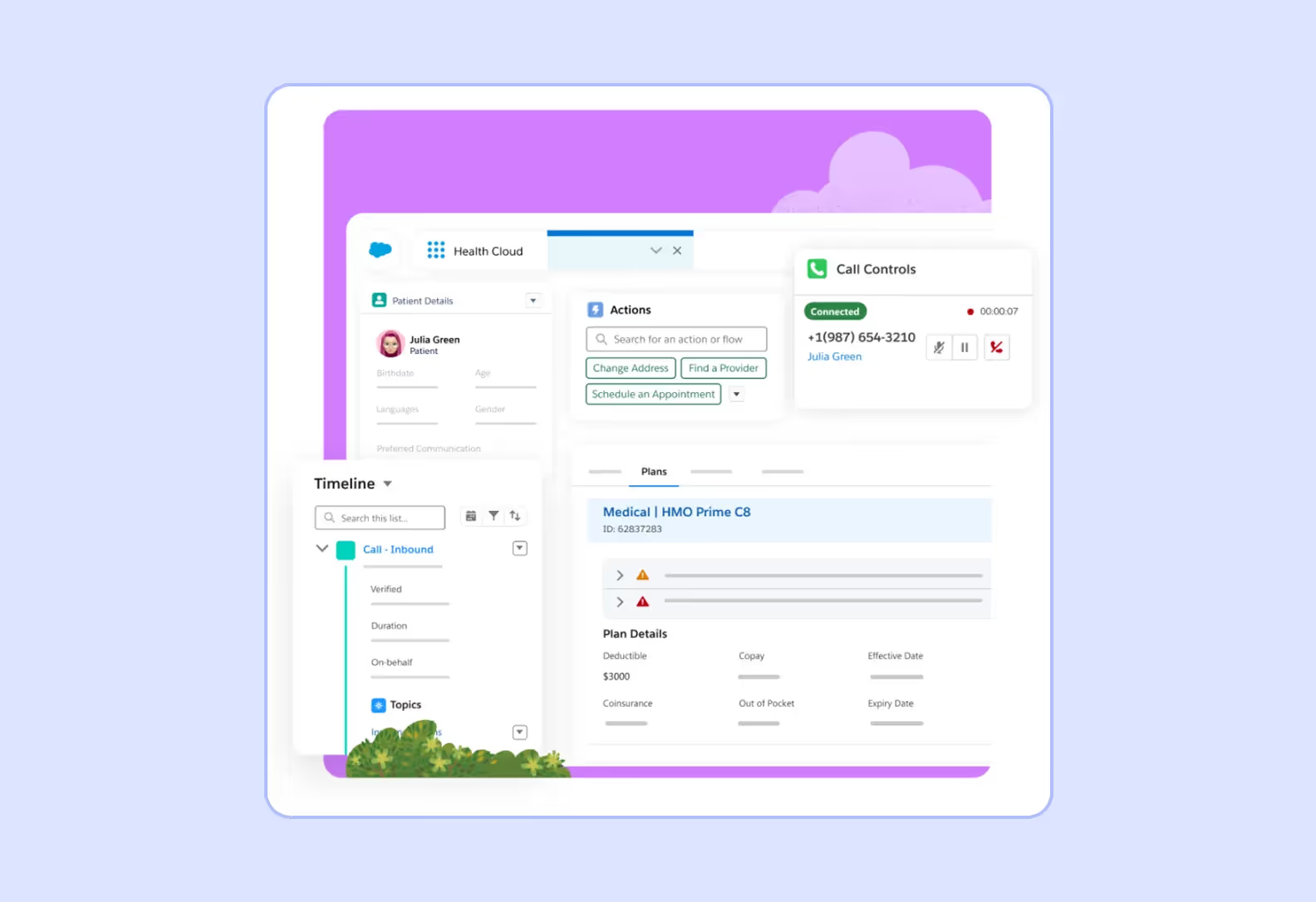
Features:
Microsoft has made significant inroads in healthcare CRM by adapting its Dynamics 365 platform. Its strength lies in integration with other Microsoft tools while providing relationship management capabilities.
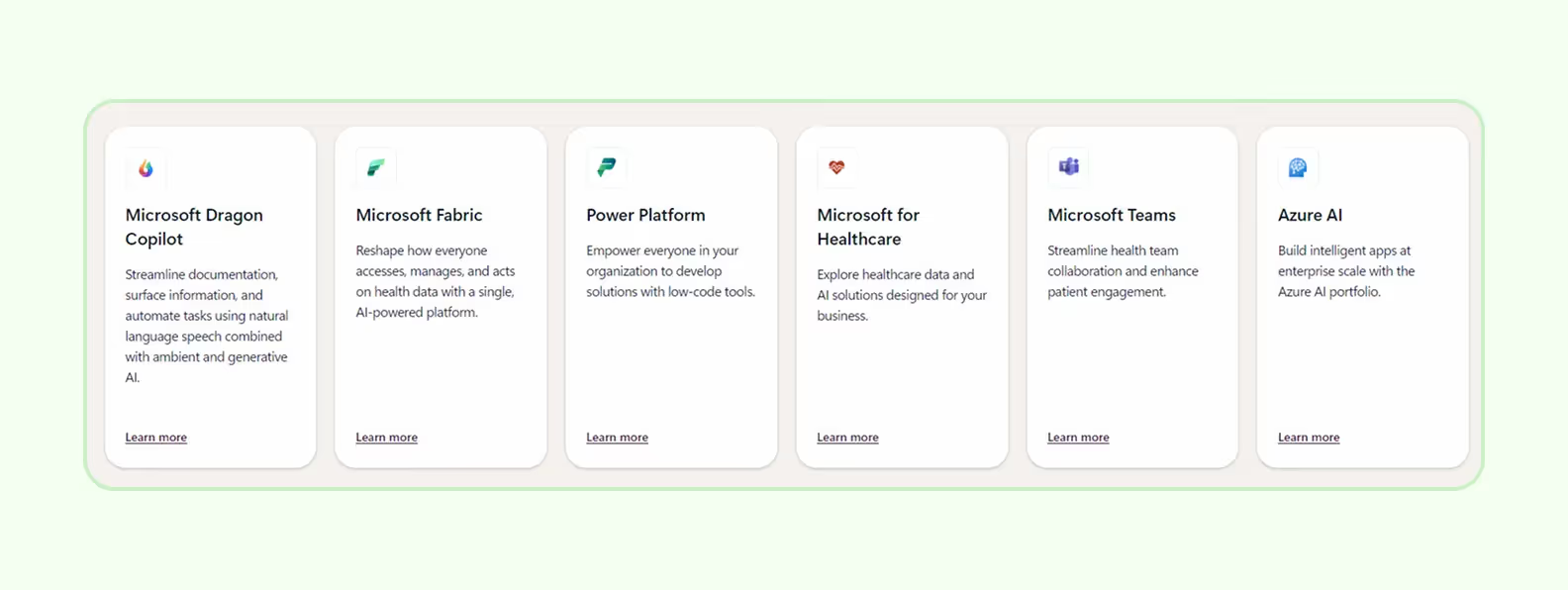
Features:
HubSpot has successfully adapted its marketing-focused CRM to serve healthcare organizations, particularly those emphasizing growth and patient acquisition. It’s popular among telehealth providers and digital-first healthcare practices.
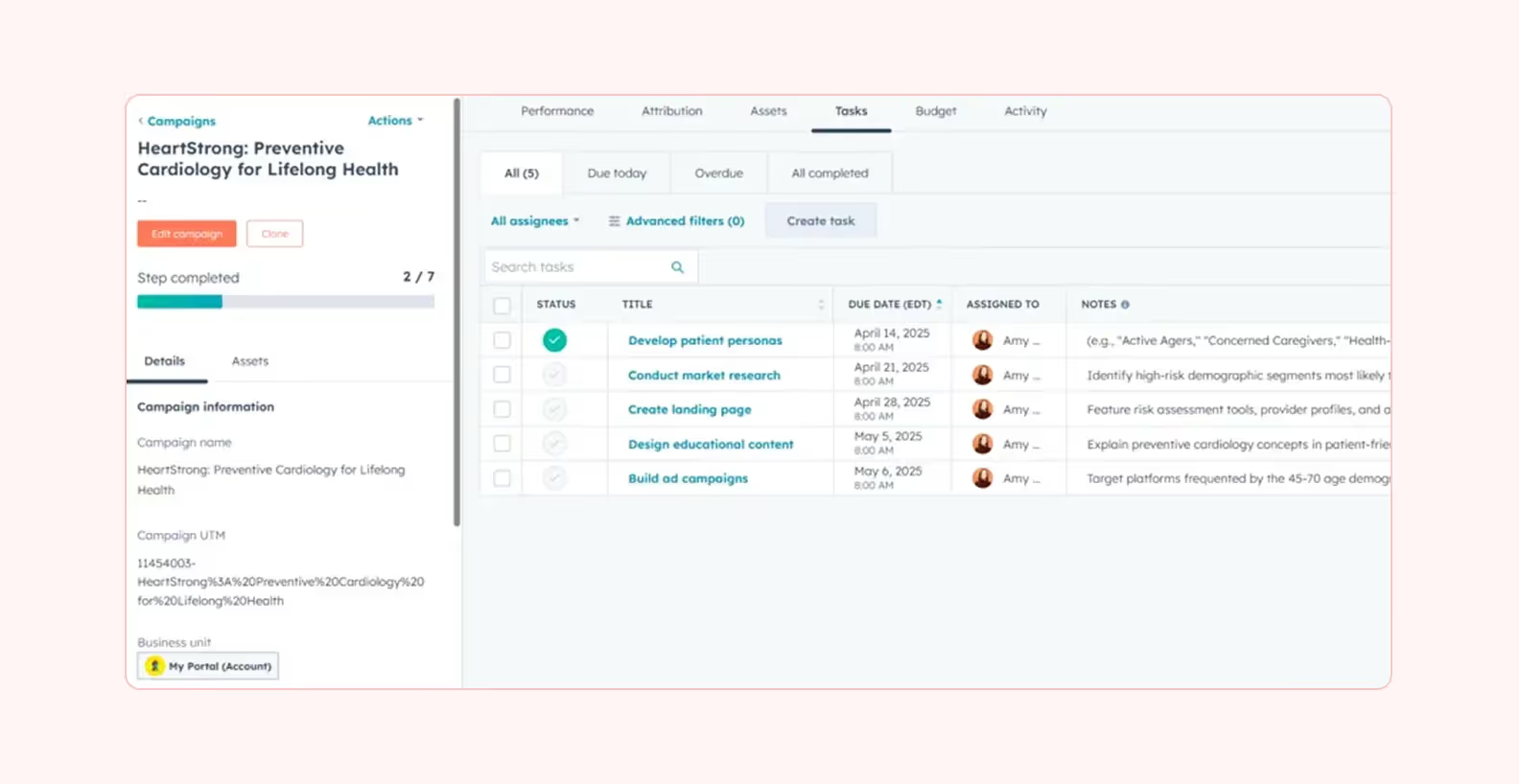
Features:
Zoho is an affordable yet powerful option for smaller medical practices and growing healthcare organizations. Its healthcare CRM offers comprehensive features without enterprise-level costs.
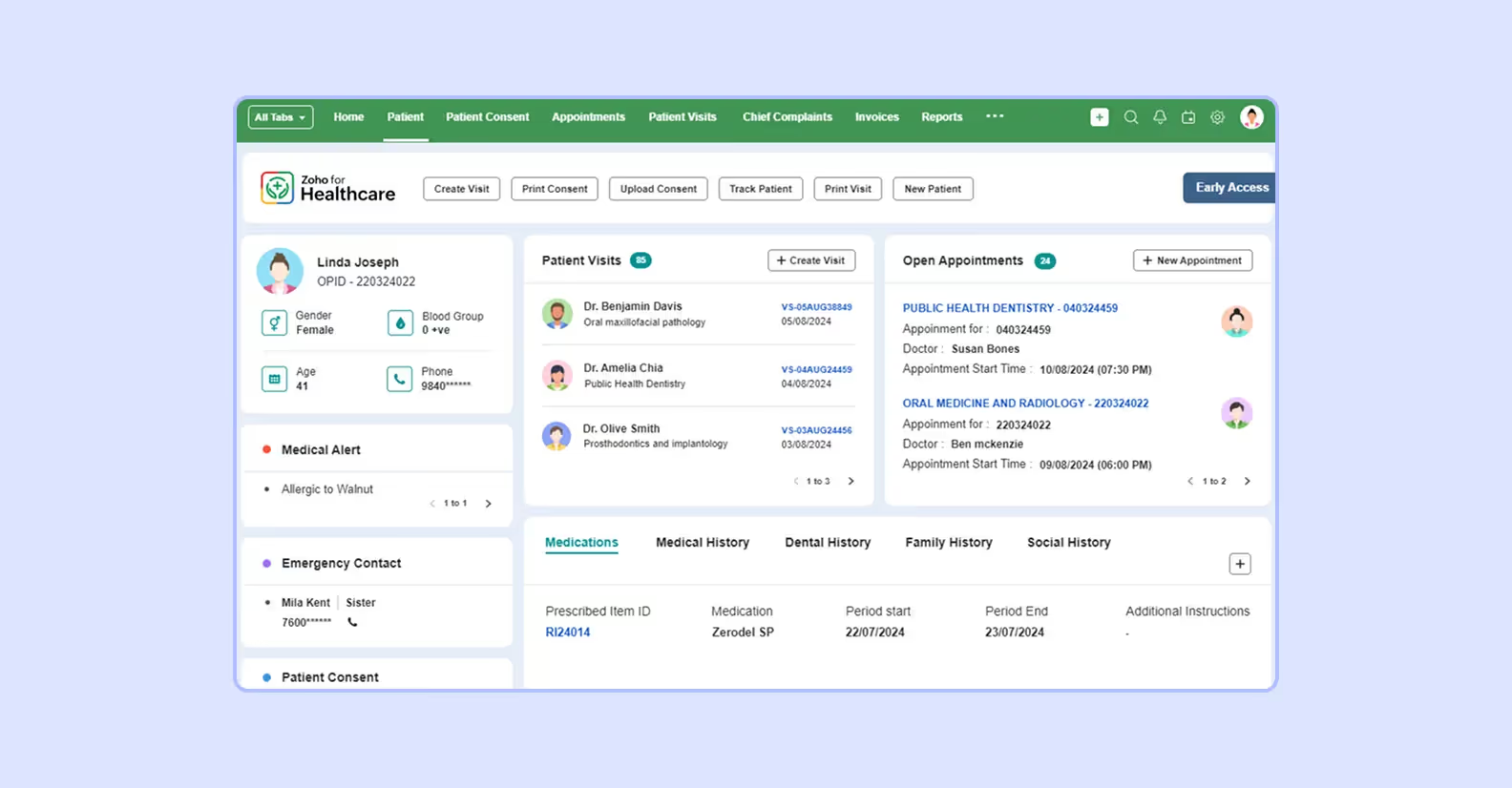
Features:
The trend across all platforms is clear: integration capabilities, patient engagement tools, and compliance features have become essential rather than optional.
When selecting a CRM for your healthcare practice, one of the biggest decisions you’ll face is whether to choose an off-the-shelf solution or invest in custom healthcare CRM development. Let’s examine the key differences to help you make an informed decision.
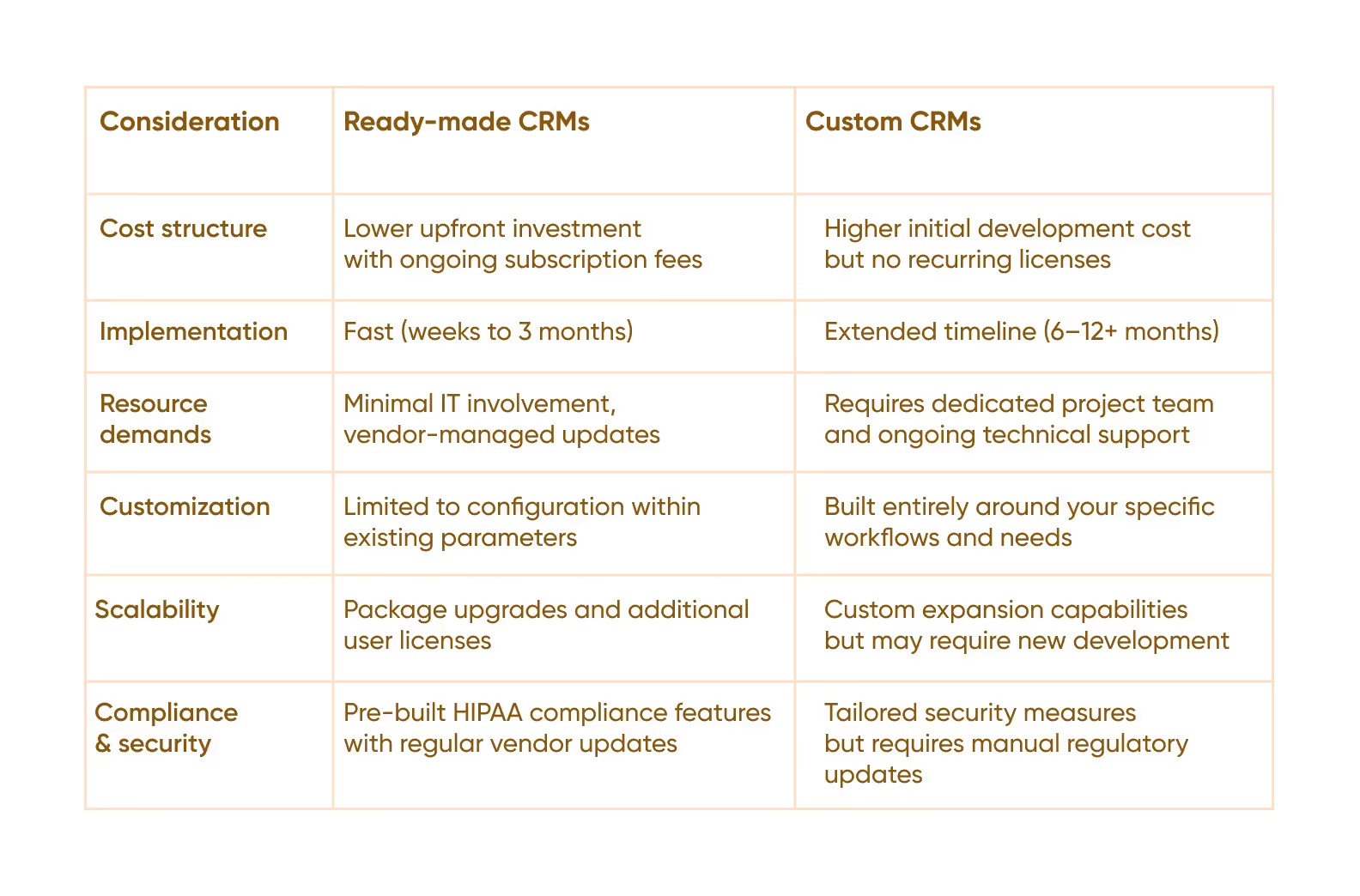
Ready-made CRMs involve lower upfront costs but ongoing subscription fees. You’ll pay per user, often monthly or annually, with potential extra charges for premium features or support.
This model spreads expenses over time, making budgeting more predictable.
Custom solutions, conversely, require substantial initial investment in development, testing, and deployment. While you avoid recurring subscription fees, you’ll still face maintenance costs and expenses for future updates.
Time-to-deployment varies between these options. Ready-made CRMs can be implemented in weeks to a few months, as they come pre-configured with healthcare-specific features. Your team can quickly begin using core functions while gradually adopting more complex capabilities.
Custom solutions require six months to a year or more for full development and deployment. This extended timeline includes requirements gathering, design, development, testing, and training phases.
The resource demands extend beyond just money. Ready-made systems require less technical involvement from your team, with vendor support handling most technical aspects. However, you’ll still need staff time for configuration, data migration, and training.
Custom development demands significantly more internal resources, including dedicated project managers, extensive input from clinical and administrative stakeholders, and potentially ongoing IT support.
Off-the-shelf solutions offer configuration options within pre-determined parameters. You can adjust workflows, create custom fields, and set up automated processes, but only within the system’s existing architecture.
Custom CRMs provide unlimited flexibility, with every feature built specifically for your unique processes and needs. This distinction matters most for specialty practices with workflows that differ significantly from standard healthcare operations.
<div class="post_divider"></div>
⭐ Our experience
We created Medico when an oncologist came to us with a problem: he was spending too much time on routine check-ups instead of helping patients who needed immediate care.
The project consisted of two main parts: a mobile app for patients and a website for doctors. Patients use the app to answer health questions and upload test results from home. Doctors can see all this information on customized dashboards that highlight any concerning changes.
The system took us about 18 months to complete because we had to make sure it met all healthcare privacy rules. While it wasn’t technically complicated, we had to be extremely careful with customer data security.
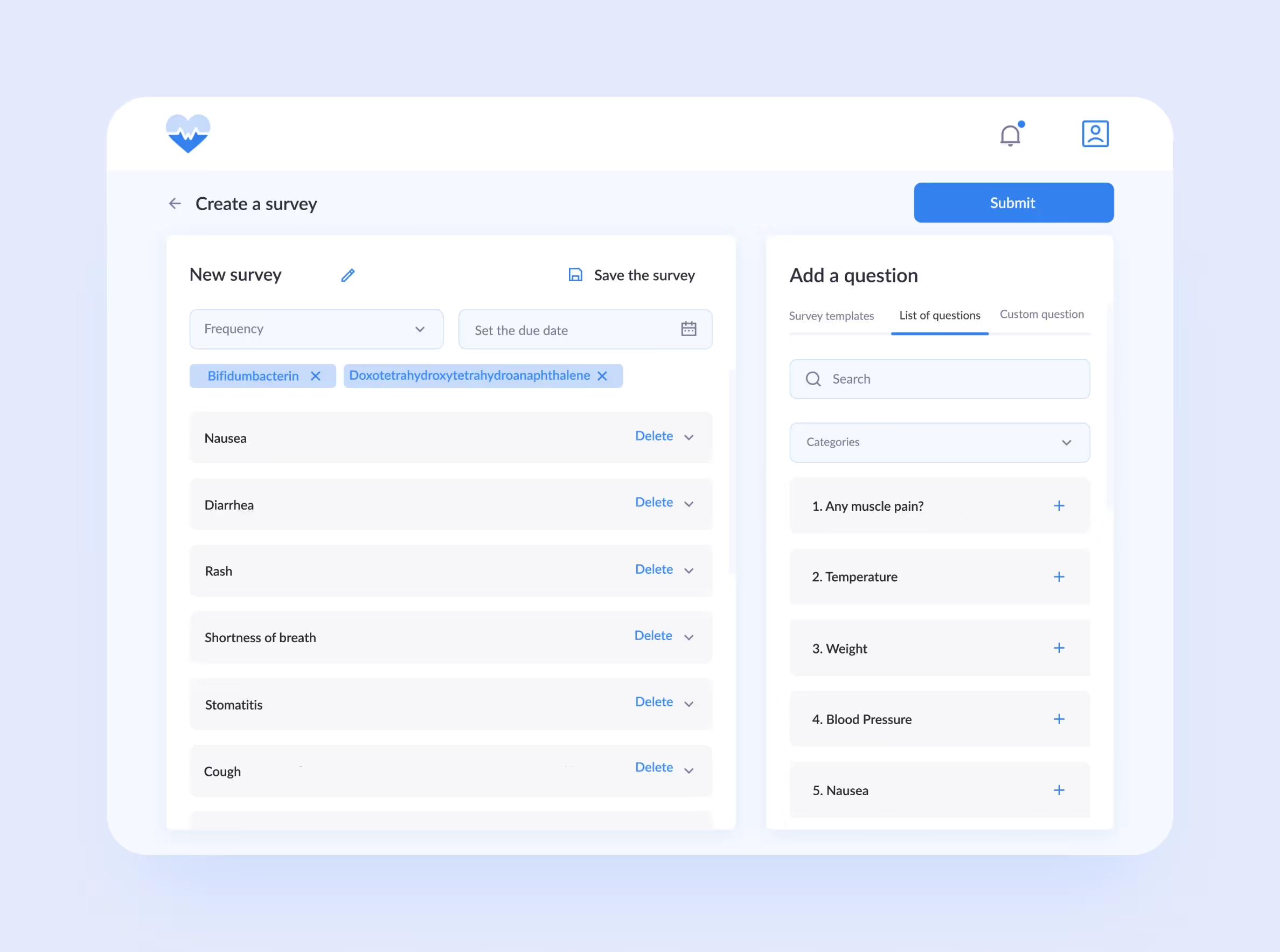
<div class="post_divider"></div>
As your practice grows, your CRM needs will evolve. Ready-made systems typically offer tiered packages that accommodate growth through additional user licenses or module activation. This approach provides straightforward scaling, but may eventually hit limitations if your needs become highly specialized.
Custom solutions can be designed with future growth in mind, but each expansion may require additional development work. The best approach depends on your growth trajectory. Predictable expansion fits well with ready-made solutions, while practices anticipating unique future needs might benefit from custom development.
Ready-made solutions typically come with built-in HIPAA compliance features that have been tested across many implementations. Vendors regularly update these systems to address new regulations or security threats, often without additional cost.
Custom CRMs allow for specialized security measures tailored to your specific risk profile and compliance needs. Companies with unique compliance requirements, such as research institutions or multinational practices, may benefit from custom security implementations that address their specific regulations.
With numerous options available, finding the perfect fit requires careful consideration of several factors. Here they are:
Start by identifying your practice’s specific pain points and objectives. Are you struggling with appointment no-shows? Looking to enhance patient engagement? Needing better data analysis?
Document your requirements and workflow challenges. Involve clinical and administrative staff in this process — their daily experiences will highlight needs that executives might overlook.
A CRM must work seamlessly with existing systems, particularly your EHR. Ask potential vendors for specific examples of successful integrations with your current software.
Determine whether connections are native or require third-party middleware. Consider future integration needs as well — will this CRM connect easily with other tools you might adopt later? Integration failures can create data silos that undermine the very efficiency your CRM should deliver.
<div class="post_divider"></div>
⭐ Our experience
At Purrweb, we built Talk to Me, a website that helps patients book video sessions with therapists. Our client needed a system that would be easy to use for people dealing with anxiety or depression.
We knew users might be feeling overwhelmed, so we made everything as simple as possible. The booking process takes just a few clicks, and the schedule shows available times clearly. Instead of spending months building our own video calling system, we connected with an existing service called Agora, which saved us time and money.
The key insight here was the importance of balancing custom development with third-party integrations to meet timeline and budget requirements.
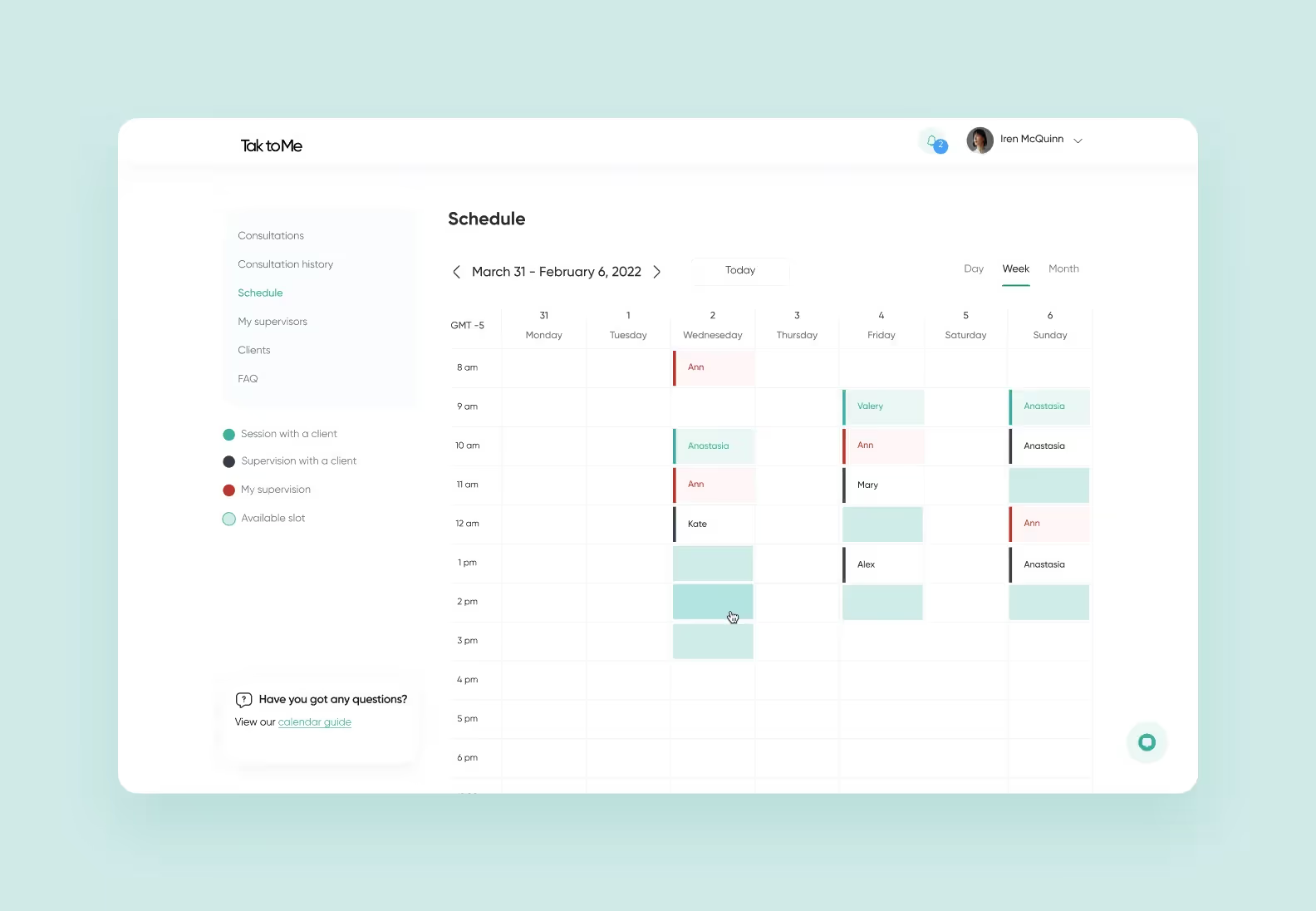
<div class="post_divider"></div>
Research multiple providers, examining their healthcare experience and client retention rates. Request demonstrations focused on your specific requirements rather than general overviews.
Don’t limit yourself to ready-made healthcare CRM solutions — explore custom development options if your needs are highly specialized or unique to your practice model. We at Purrweb specialize in creating custom CRMs that provide better long-term value for practices with distinctive workflows.
The most feature-rich system provides little value if staff find it difficult to use. Arrange hands-on testing with actual end users from various departments.
Evaluate interface intuitiveness, mobile accessibility, and training requirements. Remember that staff resistance can derail even technically perfect implementations.
Look beyond the initial purchase price to understand comprehensive costs. Factor in implementation, training, customization, ongoing support, and potential infrastructure upgrades.
Calculate potential ROI based on efficiency gains, reduced no-shows, and improved collections. This complete financial picture prevents budget surprises and helps justify your investment to stakeholders.
Healthcare CRMs help medical professionals keep track of patient information and improve how they work. Choosing the right system, whether off-the-shelf or custom-built, depends on what your practice needs most. As medical care continues to use more digital tools, these systems help practices take better care of patients while making daily work smoother.
➡️ Purrweb is ready to create a healthcare CRM system for your medical practice. <a class="blog-modal_opener">Fill out the form</a> and get a free project estimation in 48 hours!